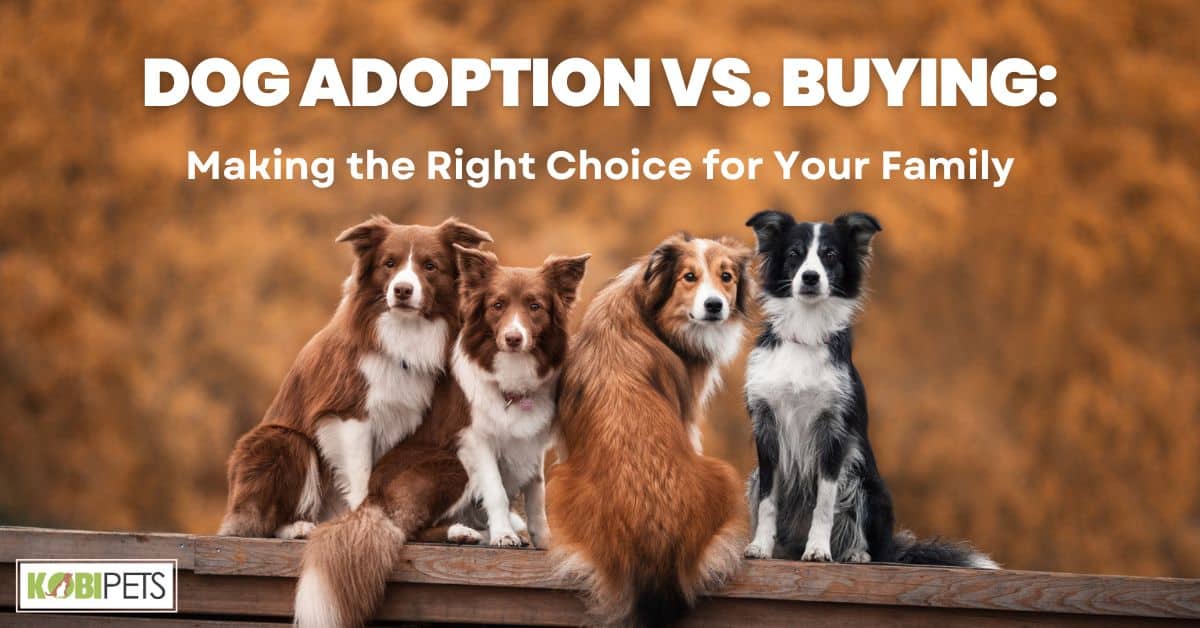
Choosing between dog adoption and buying a puppy is a significant decision for any family. Adoption offers a chance to give a shelter dog a loving home while buying support from responsible breeders. Consider your family’s lifestyle, needs, and willingness to commit to training and care when making this critical choice, as both options can bring joy and companionship to your life.
Bringing a dog into your family is a big decision. Should you adopt from a shelter or buy from a breeder? It’s a choice that will shape your future together. In this article, we’ll explore the pros and cons of dog adoption versus buying, helping you make an informed choice that suits your family’s unique needs and values.
The Case for Dog Adoption
Bringing a dog into your life is an exciting decision, but it comes with an important choice: dog adoption or purchasing from a breeder. In this section, we’ll explore “The Case for Dog Adoption.” It’s more than just getting a pet; it’s about saving lives, finding diversity, saving costs, and fostering loyalty.
1. Saving a Life
One of the most profound and rewarding aspects of dog adoption is the opportunity to be a lifesaver. Shelters and rescue organizations serve as lifelines for needy dogs, many of whom have faced hardship, neglect, or abandonment.
Your choice to adopt provides a second chance at life for these canines, offering them the possibility of a happier, healthier, and more fulfilling existence. It’s heartwarming to know that by adopting, you become a beacon of hope in a dog’s world, and your kindness truly makes a difference.
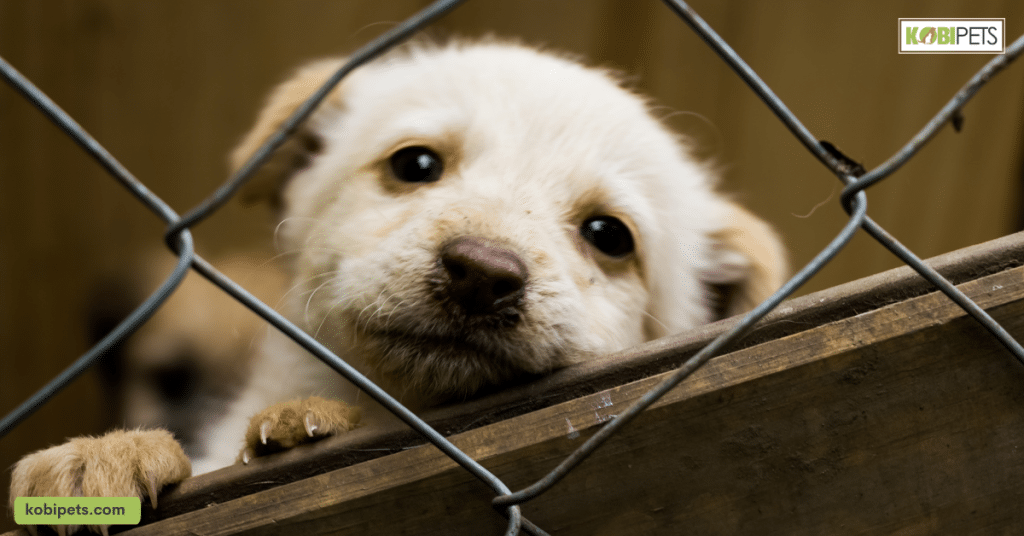
2. Diverse Selection
Shelters and rescues boast an incredible diversity of dogs, making it more likely that you’ll find the perfect fit for your family. Whether you’re seeking a playful and energetic companion, a gentle and calm presence, a specific breed, or a unique mix, the chances are high that your local shelter has a dog that suits your preferences. This variety allows you to select a canine companion whose personality and needs align with your lifestyle, ensuring a harmonious and rewarding partnership.
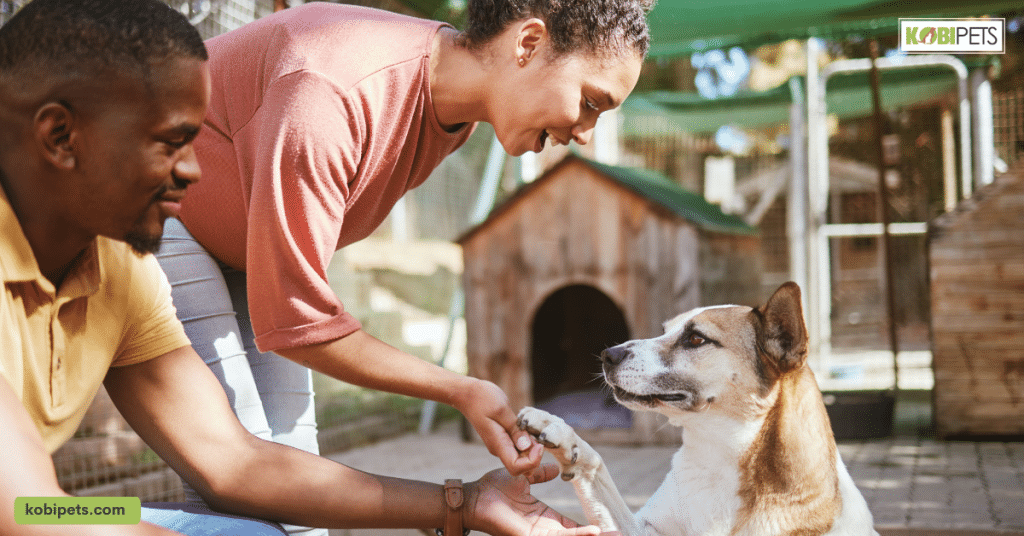
3. Cost-Efficiency
Beyond the emotional rewards, adopting a dog can be financially savvy. Many shelter dogs come spayed or neutered with their initial vaccinations. These essential healthcare procedures are often included in the adoption fee, saving you both time and money.
This cost-efficiency allows you to start your journey as a pet owner on a solid foundation, with your new furry family member already on the path to a healthy and happy life.
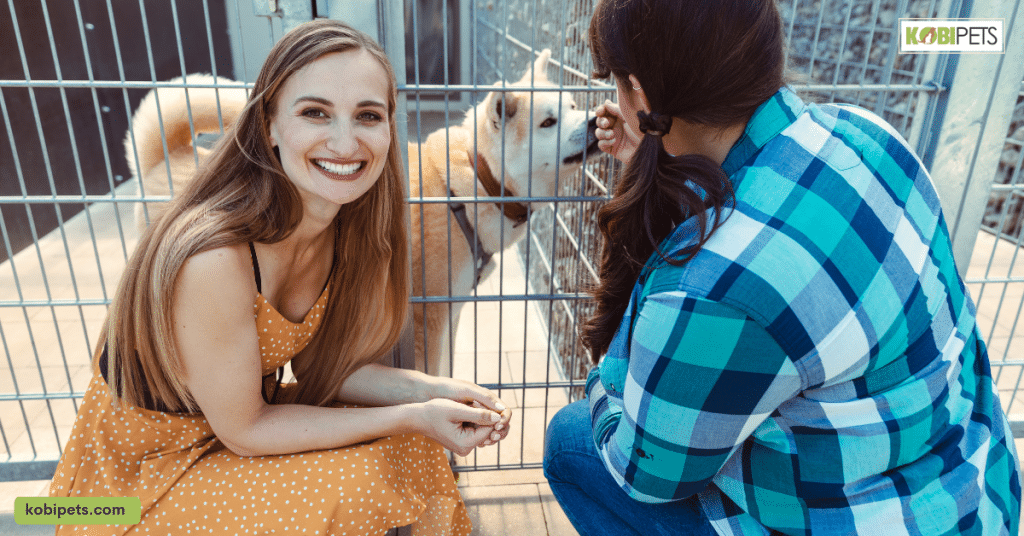
4. Gratitude and Loyalty
Shelter dogs have a remarkable capacity for gratitude and loyalty. They understand, in their own way, that you’ve given them a second chance at life. This understanding often translates into a deep and unwavering bond with their new families.
The loyalty and affection of an adopted dog are heartwarming and genuine, forming connections that often grow stronger with time. When you adopt, you’re not just gaining a pet; you’re welcoming a lifelong friend who appreciates your love and care in a unique and touching manner.
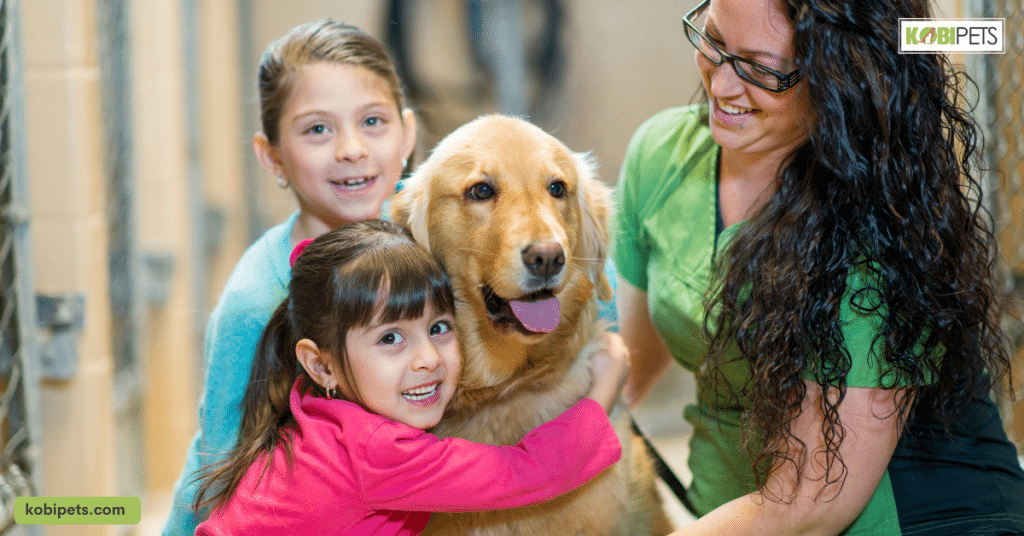
The Pros and Cons of Buying a Dog
In the end, the decision between dog adoption and purchasing from a breeder or pet store should reflect the unique needs and values of your family. Each option comes with its distinct advantages and drawbacks, as summarized in the following tables:
| Pros | Cons | |
|---|---|---|
| Dog Adoption | – Life-saving: Rescuing a shelter dog offers a chance at a brighter future – Diverse Selection: Shelters offer a wide variety of dogs, each with its own unique charm – Cost-effectiveness: Many shelter dogs come with vaccinations and spaying/neutering, reducing initial expenses – Gratitude and Loyalty: Shelter dogs often form deep and lasting bonds with their new families |
– Limited breed choices: Specific breeds may not be readily available – Unknown history: Background and early life details may be uncertain – Potential health concerns: Some shelter dogs may have medical issues – Training requirements: Patience and training may be needed to address behavioral issues |
| Buying a Dog | – Breed Selection: Allows for specific breed preferences – Health Assurance: Reputable breeders prioritize the health and genetics of their dogs – Predictable Temperament: Breeders can provide insights into a dog’s behavior – Training and Socialization: Easier to shape behavior from a young age |
– Higher Initial Costs: Puppies from reputable breeders can be expensive – Supporting Breeding Practices: Buying from a breeder may unintentionally support unethical breeding – Limited Shelter Support: May have a lesser direct impact on the shelter dog population – Potential for Impulsive Decisions: Careful consideration may be overlooked |
Remember, your choice should align with your family’s unique circumstances and values, with responsible pet ownership as the guiding principle. Whether you adopt or buy, the love, companionship, and joy a dog brings to your family will undoubtedly make it a rewarding journey.
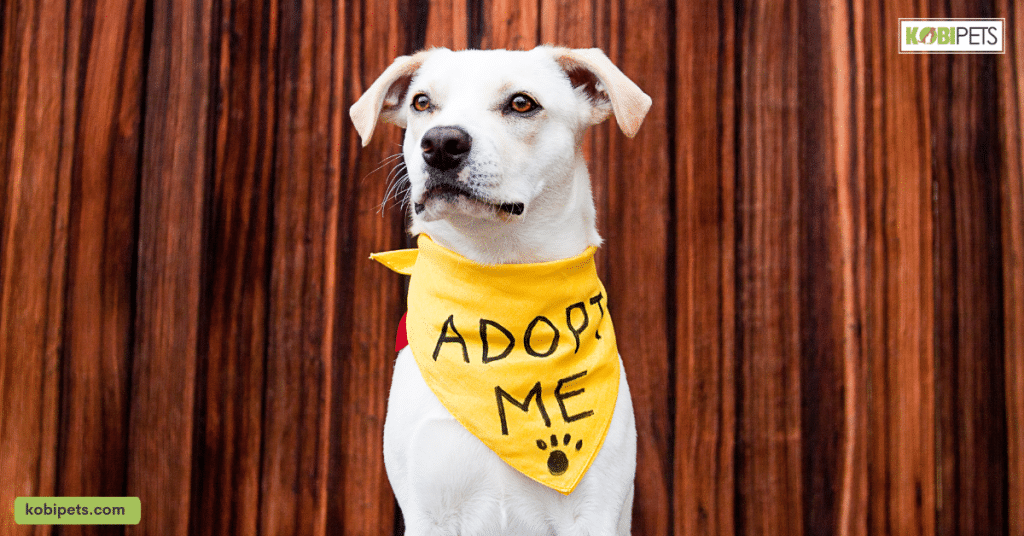
Family Considerations
When it comes to choosing a furry companion, your family’s lifestyle and needs should be at the forefront of your decision-making process. Dogs are not one-size-fits-all, and finding the perfect match for your family dynamic can make all the difference. Consider factors like the size of your home, your activity level, and the ages of family members.
If you have young children, you might seek a breed known for its gentle and patient nature, while an active family may prefer a high-energy breed that can keep up with outdoor adventures. Research and consult with experts to ensure you choose a dog whose temperament and exercise requirements align with your family’s routine.
Whether you opt for adoption or purchase, selecting a dog that complements your family’s lifestyle ensures a harmonious and fulfilling relationship, where both you and your new furry family member can thrive together.
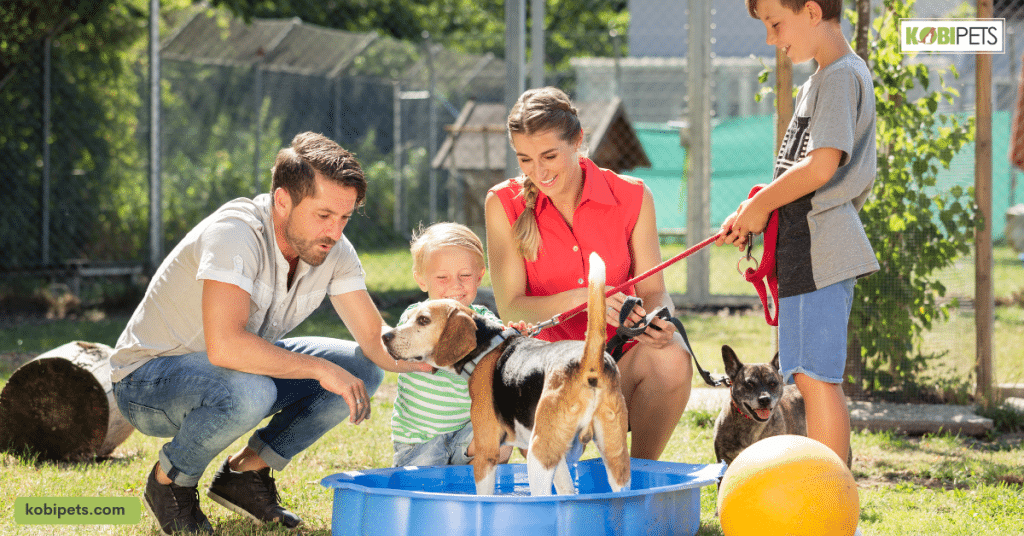
The Responsibility of Dog Ownership
Bringing a dog into your life is a heartwarming experience, but it also comes with significant responsibilities. As a dog owner, you embark on a journey filled with love, companionship, and countless rewarding moments.
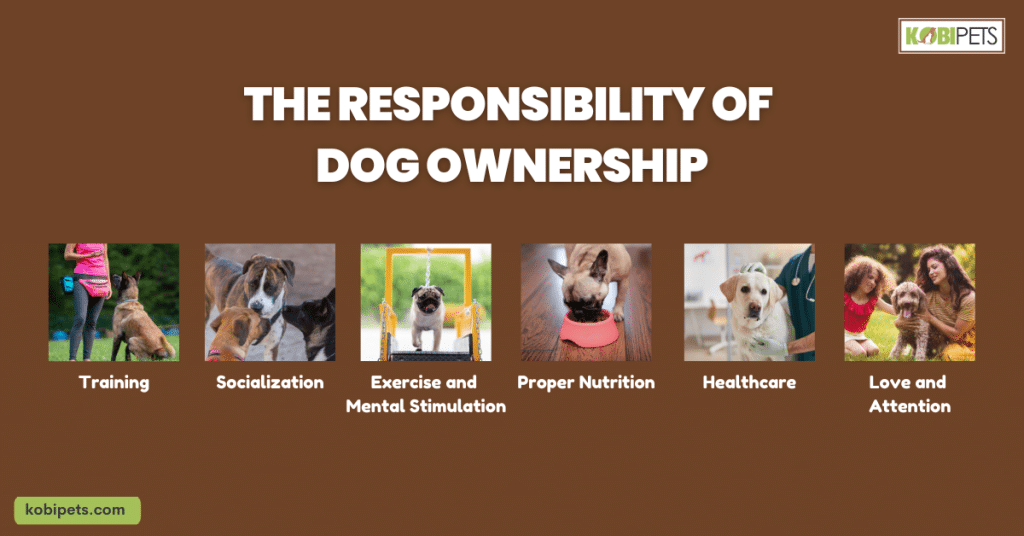
The Responsibility of
Dog Ownership
- Training: Effective training is not just a choice; it’s a fundamental responsibility. Properly trained dogs are not only well-behaved but also safer and happier. Consider enrolling in obedience classes or working with a professional trainer to ensure your dog understands commands and boundaries.
- Socialization: Socializing your dog from an early age is key to their development. Exposure to various people, animals, and environments helps them become well-adjusted and confident companions. Regular outings and playdates can contribute to a socially adept dog.
- Exercise and Mental Stimulation: Dogs thrive on physical and mental stimulation. Daily exercise, such as walks, playtime, and interactive toys, keeps them physically fit and mentally engaged. Neglecting these needs can lead to behavioral issues and unhappiness.
- Proper Nutrition: Providing a balanced and nutritious diet is essential for your dog’s overall health. Consult with a veterinarian to determine the best diet for your dog’s age, breed, and specific needs.
- Healthcare: Regular veterinary check-ups, vaccinations, and preventive care are non-negotiable aspects of responsible dog ownership. Ensuring your dog’s health and well-being requires consistent attention to their medical needs.
- Love and Attention: Dogs are social animals that thrive on companionship and affection. Spending quality time with your dog, offering affection, and meeting their emotional needs are vital for a strong human-canine bond.
“The Responsibility of Dog Ownership” is a commitment that extends beyond the initial excitement of bringing a dog into your home. It’s about creating a nurturing environment where your canine companion can flourish. By taking these responsibilities seriously, you not only enhance your dog’s life but also cultivate a fulfilling and lasting relationship built on trust, love, and mutual care.
In conclusion
Being a responsible dog owner is more than just providing food and shelter; it’s a profound commitment to the well-being and happiness of your furry friend. The responsibilities encompass training, socialization, exercise, nutrition, healthcare, and, most importantly, love and attention.
These elements are essential for fostering a thriving and enduring human-canine bond. As you embark on your journey as a dog owner, remember that the rewards of responsible ownership are immeasurable.






